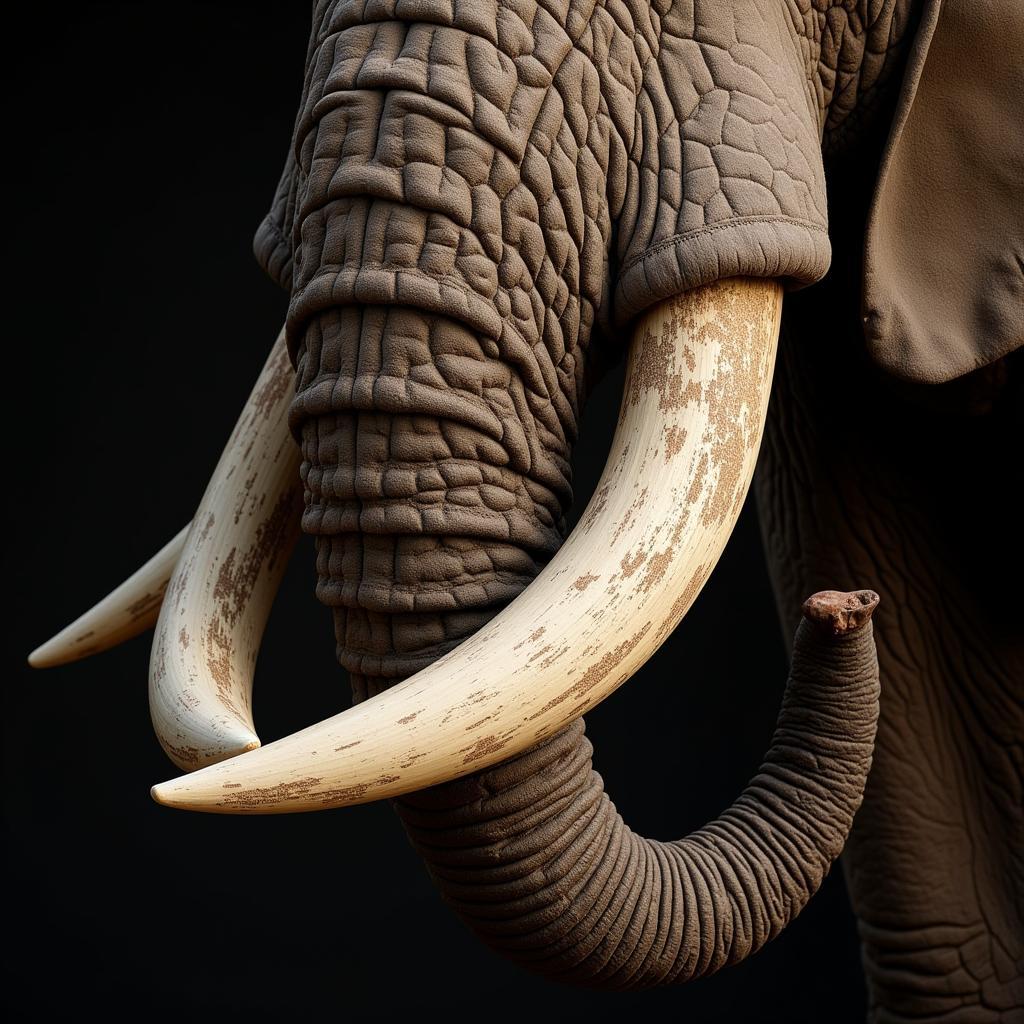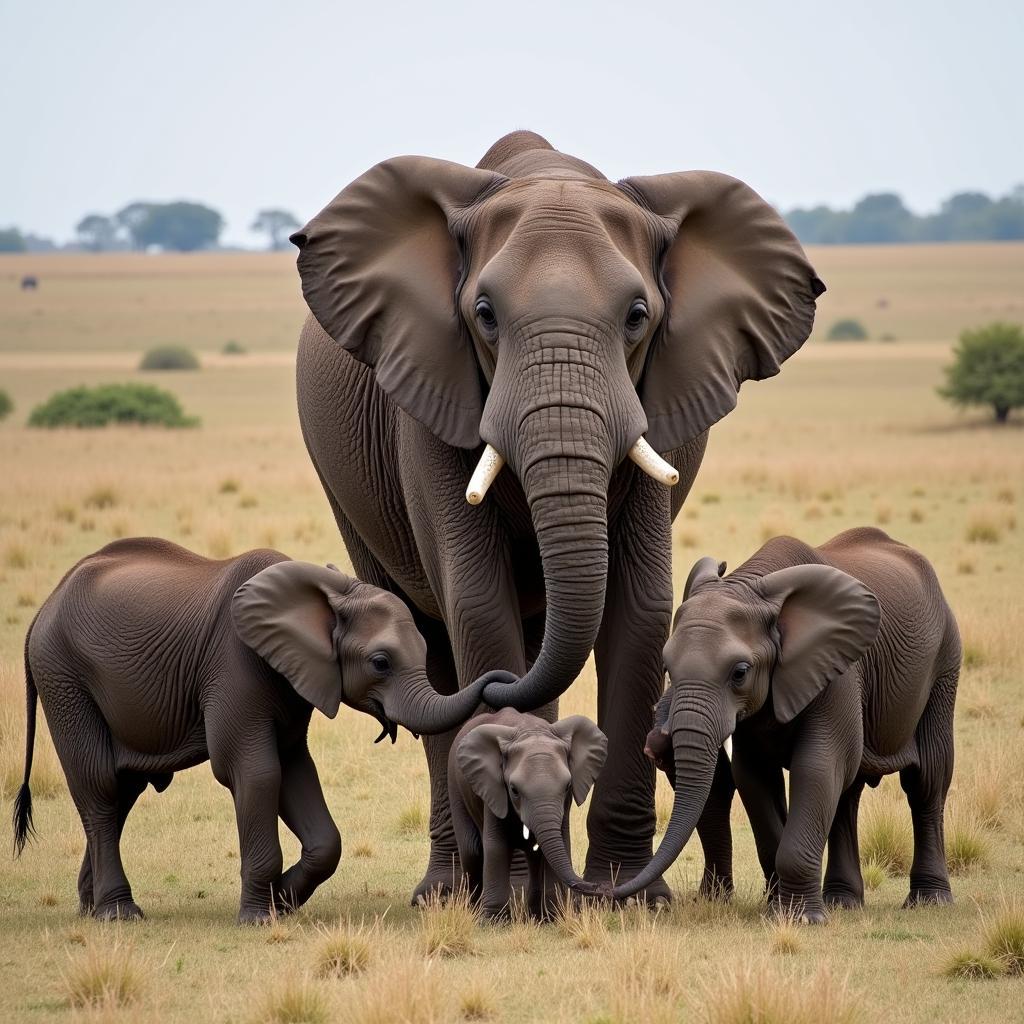The Majestic African Bull Elephant: A Symbol of Power and Wisdom
The African Bull Elephant, a creature of immense size and power, roams the savannas and forests of Africa, captivating all who encounter it. These magnificent animals play a crucial role in their ecosystems and hold a special place in the hearts of many. We’ll explore the fascinating world of these gentle giants, delving into their physical characteristics, social behavior, and the challenges they face in the modern world.
Understanding the African Bull Elephant’s Physical Prowess
African bull elephants are the largest land animals on Earth. Their sheer size is awe-inspiring, with adult bulls reaching heights of up to 13 feet and weighing as much as 6 tons. Their most striking features are their massive tusks, which are actually elongated incisor teeth made of ivory. These tusks serve various purposes, from digging for water and minerals to defending themselves against predators and rivals. Another distinctive characteristic is their trunk, a remarkably versatile appendage used for breathing, smelling, drinking, communicating, and manipulating objects.
What makes an African bull elephant’s size so impressive? Their immense size is a result of millions of years of evolution, adapting to the harsh African environment. This size provides them with a significant advantage when it comes to foraging and defending themselves.
 Close-up view of an African bull elephant's tusks, highlighting their size and texture
Close-up view of an African bull elephant's tusks, highlighting their size and texture
The Social Dynamics of African Bull Elephants
African bull elephants exhibit complex social behaviors. While females and calves live in tightly knit family groups led by a matriarch, adult bulls tend to be more solitary. However, they do interact with other bulls, forming loose bachelor herds and engaging in dominance displays to establish hierarchy. During mating season, bulls enter a state called “musth”, characterized by heightened aggression and a surge in testosterone. This can lead to intense competition between bulls for access to receptive females. For further information on this fascinating behavior, see african bull elephant in musth.
How do African bull elephants communicate? These intelligent creatures communicate through a variety of vocalizations, including rumbles, trumpets, and roars. They also use infrasound, low-frequency sounds that can travel long distances, to communicate with other elephants beyond the range of human hearing.
Conservation Concerns for the African Bull Elephant
Sadly, African bull elephants face numerous threats. Poaching for their ivory tusks remains a significant problem, despite international efforts to combat illegal wildlife trade. Habitat loss due to human encroachment and climate change also poses a serious challenge. Furthermore, human-wildlife conflict arises as elephants raid crops and damage property, leading to retaliatory killings. Learn more about confrontations between elephants and rhinos at african bull elephant vs rhino. It’s vital that we take action to protect these magnificent creatures and ensure their survival for future generations.
What is being done to protect African bull elephants? Conservation organizations are working tirelessly to protect African bull elephants through anti-poaching patrols, community engagement programs, and habitat conservation initiatives. You can also compare the size of these elephants to other animals at african bull elephant size comparison. Public awareness campaigns aim to educate people about the importance of elephant conservation and the devastating impact of the ivory trade.
 An African bull elephant interacting with a family group of females and calves
An African bull elephant interacting with a family group of females and calves
Conclusion: The Future of the African Bull Elephant
The African bull elephant, a symbol of power and wisdom, plays a vital role in the African ecosystem. By understanding their behavior, the threats they face, and the ongoing conservation efforts, we can work together to protect these majestic animals and ensure their continued existence. Learn more about the mating rituals of these magnificent creatures at african bull elephant mating. Let’s not allow these magnificent giants to disappear from our planet. You can also explore more about their unique anatomy at african bull elephant penis.
FAQ
- What is the average lifespan of an African bull elephant? They typically live for 50-70 years.
- What do African bull elephants eat? They are herbivores and primarily eat grasses, leaves, bark, and fruits.
- How much water does an African bull elephant drink per day? They can drink up to 50 gallons of water per day.
- How fast can an African bull elephant run? They can reach speeds of up to 25 miles per hour.
- How do bull elephants use their tusks? Tusks are used for digging, defense, and displaying dominance.
When needing assistance, please contact us at Phone Number: +255768904061, Email: [email protected], or visit our address: Mbarali DC Mawindi, Kangaga, Tanzania. Our customer service team is available 24/7.
